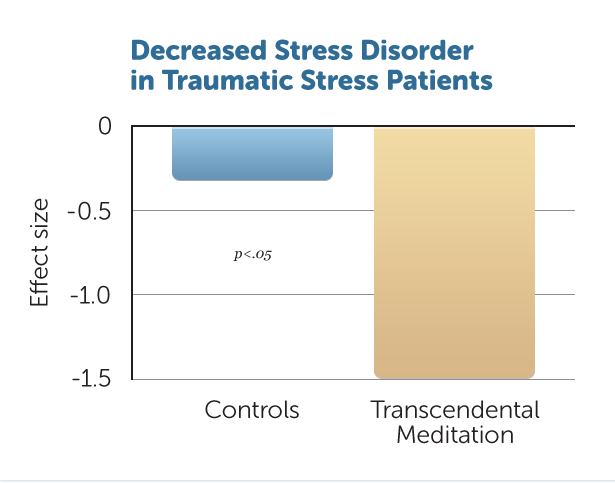Increased Physiological Calmness in Executives and Workers
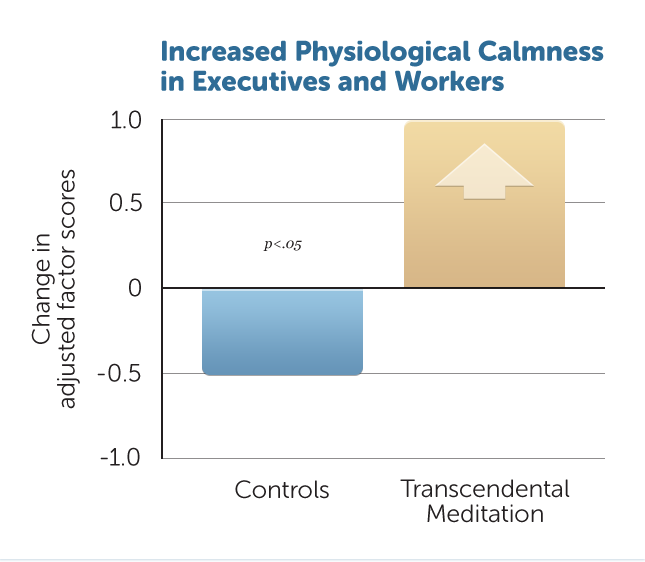 A study of executives and workers in the automotive industry found that after three months of regular practice of the Transcendental Meditation Programme, participants showed increased physiological calmness, as assessed both during rest and during task performance, in comparison to controls from the same work sites.Ref.Anxiety, Stress and Coping: An International Journal 6: 245–262, 1993
A study of executives and workers in the automotive industry found that after three months of regular practice of the Transcendental Meditation Programme, participants showed increased physiological calmness, as assessed both during rest and during task performance, in comparison to controls from the same work sites.Ref.Anxiety, Stress and Coping: An International Journal 6: 245–262, 1993
PTSD cured
Decreased Stress Disorder in Traumatic Stress Patients
Patients seeking treatment for traumatic stress who learned the Transcendental Meditation Programme showed a significant reduction in symptoms of stress disorder in comparison to those receiving psychotherapy.Ref.Journal of Counseling and Development 64: 212-215, 1985
Decreased Stress Response
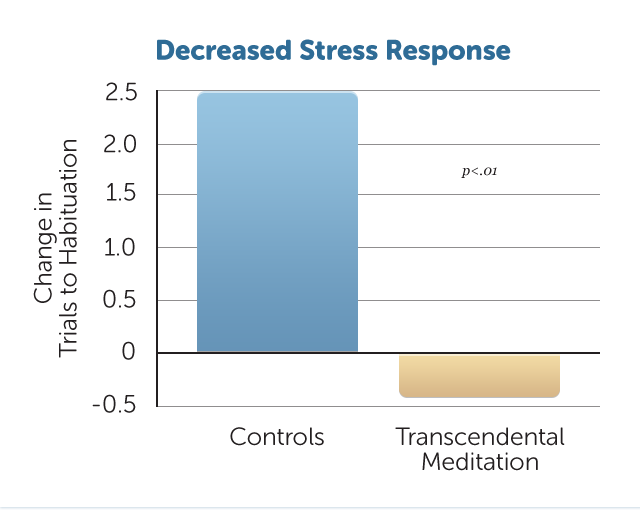 University students who learned the Transcendental Meditation Technique displayed decreased stress response after 10 week of practice, in contrast to greater stress response among students randomly assigned to a delayed-start condition. Reduced stress response was measured as quicker physiological habituation to the stressful stimulus of a loud noise. Students learning the Transcendental Meditation Technique also showed increased integration of brain functioning and decreased sleepiness in comparison to controls.Ref.International Journal of Psychophysiology 71: 170–176, 2009
University students who learned the Transcendental Meditation Technique displayed decreased stress response after 10 week of practice, in contrast to greater stress response among students randomly assigned to a delayed-start condition. Reduced stress response was measured as quicker physiological habituation to the stressful stimulus of a loud noise. Students learning the Transcendental Meditation Technique also showed increased integration of brain functioning and decreased sleepiness in comparison to controls.Ref.International Journal of Psychophysiology 71: 170–176, 2009
Decreased Stress among Managers
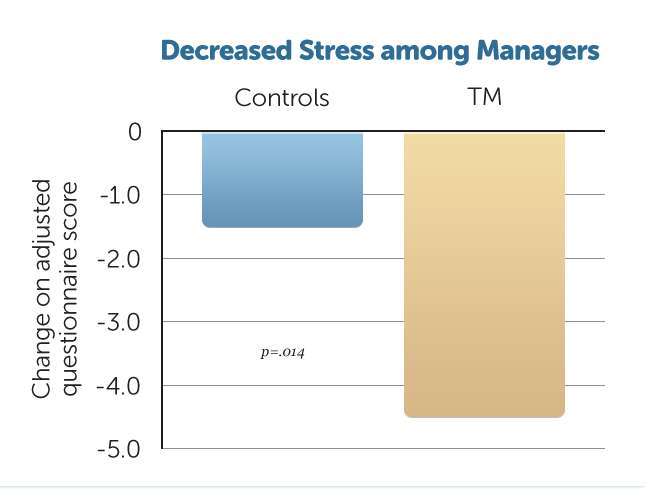 A three-month prospective study of managers at a medical equipment company found that those who learned Transcendental Meditation, compared with matched controls, showed a significant reduction on a standardized measure of perceived stress measuring the degree to which situations in one’s life are perceived as overloading, uncontrollable or unpredictable.Ref.Dissertation Abstracts International 57(6): 4068B, 1996
A three-month prospective study of managers at a medical equipment company found that those who learned Transcendental Meditation, compared with matched controls, showed a significant reduction on a standardized measure of perceived stress measuring the degree to which situations in one’s life are perceived as overloading, uncontrollable or unpredictable.Ref.Dissertation Abstracts International 57(6): 4068B, 1996
Decreased Stress During Task Performance
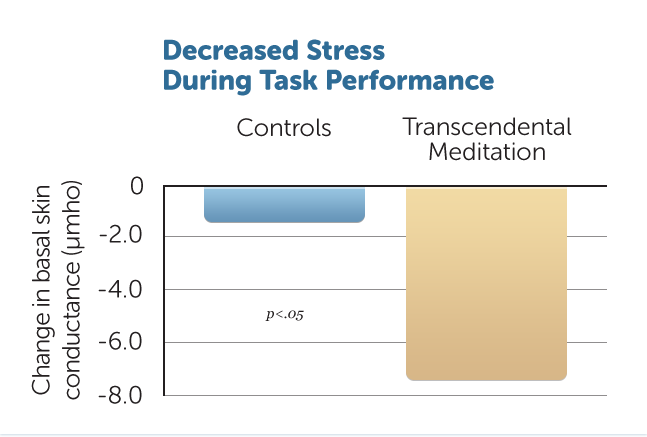 A study of executives and workers in the automotive industry found that after three months of regular practice of the Transcendental Meditation Programme, participants showed decreased physiological stress (reduced skin conductance) during performance of a task, in comparison to controls from the same work sites.Ref.Anxiety, Stress and Coping: An International Journal 6: 245–262, 1993
A study of executives and workers in the automotive industry found that after three months of regular practice of the Transcendental Meditation Programme, participants showed decreased physiological stress (reduced skin conductance) during performance of a task, in comparison to controls from the same work sites.Ref.Anxiety, Stress and Coping: An International Journal 6: 245–262, 1993
Calmer Style of Physiological Functioning: Less Stress in Daily Activity
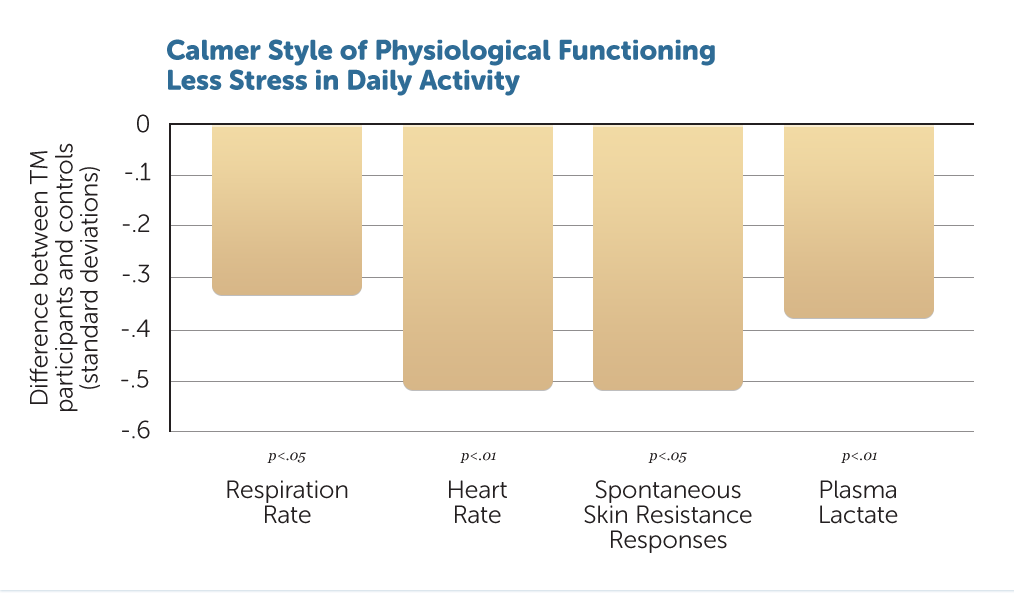 A meta-analysis found that those who practise Maharishi’s Transcendental Meditation Programme, in contrast to controls, show outside of meditation a calmer style of physiological functioning, as indicated by lower levels of respiration rate, heart rate, spontaneous skin resistance responses, and plasma lactate.Ref.American Psychologist 42: 879–881, 1987
A meta-analysis found that those who practise Maharishi’s Transcendental Meditation Programme, in contrast to controls, show outside of meditation a calmer style of physiological functioning, as indicated by lower levels of respiration rate, heart rate, spontaneous skin resistance responses, and plasma lactate.Ref.American Psychologist 42: 879–881, 1987
Quicker Recovery from Stress
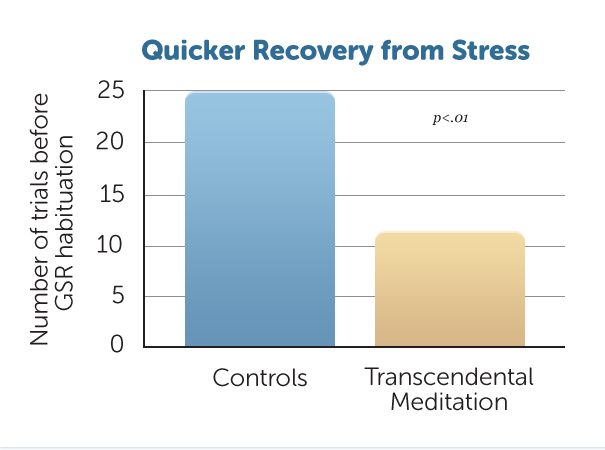 Those who practise the Transcendental Meditation Programme showed more rapid physiological recovery (measured by galvanic skin resistance) from the stress of a loud sound. A series of sounds was presented, and after fewer presentations the sound did not cause a stress response among TM practitioners.Ref.Psychosomatic Medicine 35: 341–349, 1973
Those who practise the Transcendental Meditation Programme showed more rapid physiological recovery (measured by galvanic skin resistance) from the stress of a loud sound. A series of sounds was presented, and after fewer presentations the sound did not cause a stress response among TM practitioners.Ref.Psychosomatic Medicine 35: 341–349, 1973
Greater Physiological Stability
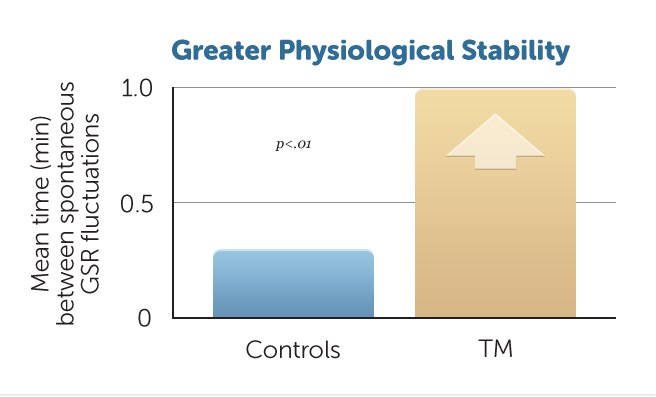 Those who practice the Transcendental Meditation Programme show more stability of the autonomic nervous system, as indicated by less frequent spontaneous skin resistance fluctuations (greater time between fluctuations).Ref.Psychosomatic Medicine 35: 341–349, 1973
Those who practice the Transcendental Meditation Programme show more stability of the autonomic nervous system, as indicated by less frequent spontaneous skin resistance fluctuations (greater time between fluctuations).Ref.Psychosomatic Medicine 35: 341–349, 1973
Decreased Stress, Anxiety, and ADHD Symptoms
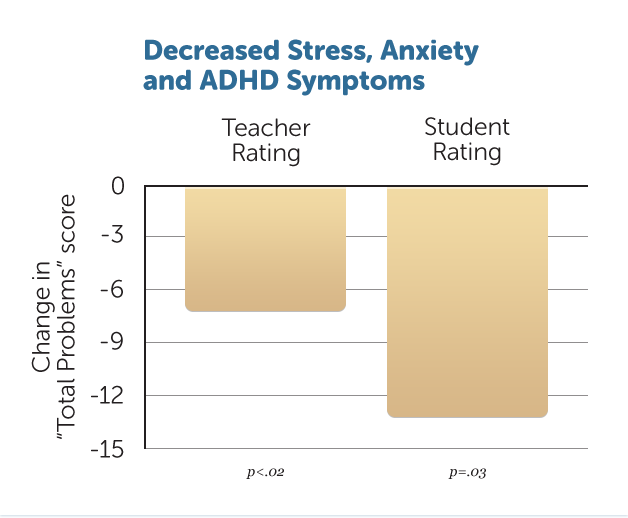 School students with a current diagnosis of attention deficit hyperactivity disorder (ADHD) who learned the Transcendental Meditation Technique displayed after three months reduced stress, anxiety, and ADHD symptoms, as rated both by teachers and by themselves. The p-value on the chart indicates improvement as determined by a multivariate test for the following subscales: anxious/depresses, withdrawn/depressed, affective problems, anxiety problems, attention problems, ADHD problems, and total problems; the bars on the chart indicate change on the total problems subscale.Ref.Current Issues in Education 10(2), 2008. [Online]
School students with a current diagnosis of attention deficit hyperactivity disorder (ADHD) who learned the Transcendental Meditation Technique displayed after three months reduced stress, anxiety, and ADHD symptoms, as rated both by teachers and by themselves. The p-value on the chart indicates improvement as determined by a multivariate test for the following subscales: anxious/depresses, withdrawn/depressed, affective problems, anxiety problems, attention problems, ADHD problems, and total problems; the bars on the chart indicate change on the total problems subscale.Ref.Current Issues in Education 10(2), 2008. [Online]
Vad framgångsrika TM-utövare säger (klicka på bilderna)
 Cameron Diaz
Cameron Diaz
 Hugh Jackman
Hugh Jackman
 Jim Carrey
Jim Carrey
 Lykke Li
Lykke Li
 Oprah Winfrey
Oprah Winfrey
 David Lynch
David Lynch
 Paul McCartney
Paul McCartney
 Clint Eastwood
Clint Eastwood
 Katy Perry
Katy Perry
 George Lucas
George Lucas
 Jerry Seinfeld
Jerry Seinfeld
 Moby
Moby
 Gwyneth Paltrow
Gwyneth Paltrow
 Martin Scorcese
Martin Scorcese
 Ellen Degeneres
Ellen Degeneres
 Dr. Oz
Dr. Oz
 År 2008 placerade Time Magazine Dr Oz som nummer 44 i listan över de 100 mest inflytelsefika människorna i världen. Han är chef för avdelningen för hjärtsjukdomar vid ett framstående sjukhus i New York, är författare till flera böcker och har för närvarande en egen tv-show som sänds över hela världen.
År 2008 placerade Time Magazine Dr Oz som nummer 44 i listan över de 100 mest inflytelsefika människorna i världen. Han är chef för avdelningen för hjärtsjukdomar vid ett framstående sjukhus i New York, är författare till flera böcker och har för närvarande en egen tv-show som sänds över hela världen.
Dr Oz har själv utövat TM sedan åtskilliga år tillbaka och han betalade själv kursavgiften för att 200 av de anställda på hans show skulle kunna lära sig tekniken. Han talar regelbundet om TM på offentliga tillställningar och förklarar hur TM har en positiv effekt på högt blodtryck, diabetes, kolesterol och hjärt- kärlsjukdomar som inte alltid går att uppnå med medicinering. Dr Oz: “TM kan ändra på saker som vi inte trodde gick att ändra på.”

“TM ger mig en edge. Tack vare att jag mediterar två gånger om dagen blir jag sällan stressad och känner mig alltid öppen för att se en utmaning ur flera perspektiv. Det har hjälpt mig att fatta beslut utifrån vad jag själv känner att jag behöver och inte utifrån yttre påfrestningar. TM håller mig i balans och gör så att jag alltid kan ge det där lilla extra.”
Gabriel Högberg - studerande


